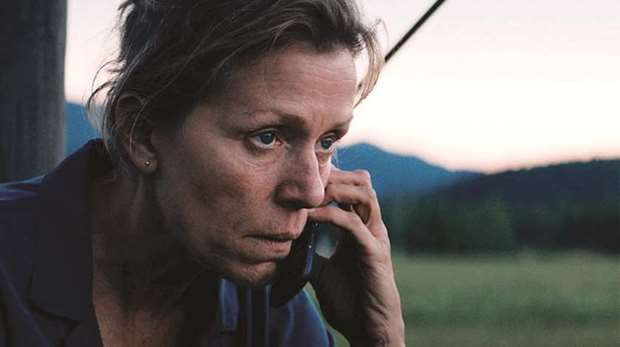Frances McDormand could not have been a better pick for the Best Actress Oscar that she clinched Sunday night for playing a mother grieving for the rape and murder of her teenage daughter in Three Billboards Outside Ebbing, Missouri. I was saddened by the fact that the picture itself did not win an award. Even its auteur, Martin McDonagh, drew a blank.
McDormand beat out Sally Hawkins in The Shape of Water, Margot Robbie in I, Tonya, Saoirse Ronan in Lady Bird and Meryl Streep in The Post.
It was many years ago that I first saw the American actress McDormand. Not face to face, but on the screen at the 1996 Cannes Film Festival. Helmed by brothers Ethan and Joel Coen, the movie titled Fargo had McDormand playing a heavily pregnant cop — a characterisation which writer-director Sujoy Ghosh lifted for his 2012 Kahani. The actress was Vidya Balan, who was not a policewoman, but a sleuth of sorts.
Balan was no patch on McDormand, who got Fargo flying with her slow but calculated mannerisms, and her uncanny sense of intuition topped by her sharp investigative acumen.
Fargo was based a true story, a crime, an insurance fraud that a husband plans and executes by having his wife kidnapped for ransom. The incident took place in Minnesota in 1987, and the Coens, who grew up in a suburb of Minneapolis and who made great cinema like Blood Simple, Miller’s Crossing, Barton Fink and No Country for Old Men, had never made a work as wonderful as Fargo. I would bet on that.
The film revolves around a desperate car salesman, Jerry Lundegaard (William H Macy), who needs money for a business venture, a parking lot, which will save him from bankruptcy. He is under the thumb of his rich father-in-law, who treats Jerry like a piece of dirt. The salesman hires a couple of thugs to kidnap his wife and promises to split the huge ransom amount. But the plan goes horribly wrong, and the woman is killed by the two hoodlums — who actually goof up the whole thing.
McDormand essays the region’s police chief, and won an Oscar in 1997 for an extraordinary performance. And the pivotal part lay so light on her, and the casual way she cracks the case and gets Jerry in the climax make the movie so marvellous to watch.
Two decades later, I would see McDormand again in yet another fascinating film, Three Billboards Outside Ebbing, Missouri, at the Venice Film Festival last Fall. It was dark, but comic — a revenge drama about a mother thirsting to get her hands on her daughter’s killer. And what a way she chooses!
Billboards in America are almost iconic, and they are an integral part of the landscape. When McDormand’s Mildred Hayes gets tired of waiting for the police to nab the culprit, she buys space on three billboards outside her little town, Ebbing. And in bold letters, she has this written: “Raped While Dying; And Still No Arrests; How Come, Chief Willoughby?” The same piercing message on all three questioning the sheriff there.
Willoughby tries to talk to Mildred, and tells her that he could find no leads in the case. When she remains adamant, he says he is dying of cancer. The police chief is a nice guy and the whole town loves him, and obviously Mildred finds herself alone. To add to all this is a racist cop, Jason Dixon (Sam Rockwell who clinched the supporting actor Oscar), who gives Mildred a trying time.
There are several other characters in the movie, but Mildred’s is the most gripping and substantial. She is seen as tough and fearless, and I cannot forget a scene where she pokes the town’s dentist with a needle when he needles her. Pitted against her ex-husband, her own son, the town’s police force, Mildred finds but one soul on her side, a dwarf, who is in love with her and is willing to go to any length to help her. Even fling a few petrol bombs at the police station in the middle of the night.
Honestly, Three Billboards... would not have sparkled had it not been for McDormand — much in the same way, Fargo, would not have.
There is something delectable about McDormand which reflects in the characters she portrays, and nobody can miss her wit. On screen and off it. And in her Sunday’s Oscar acceptance speech, she was both comical and critical. “Pick me up if I fall over a little bit, because I’ve got some things to say,” McDormand said with palpable intensity. And after asking all the female nominees (in all categories) in the room to stand up, she said: “Look around, ladies and gentlemen, because we all have stories to tell and projects we need financed. Don’t talk to us about it at the parties tonight. Invite us into your office in a couple days — or you can come to ours, whichever suits you best — and we’ll tell you all about them.”
I only hope that McDormand would not have to wait another two decades to land a role as riveting as Mildred.
*Gautaman Bhaskaran has been
writing on Indian and world cinema close to four decades, and may be e-mailed at [email protected]

INDELIBLE IMPRINT: Frances McDormand essaying the role of a grieving mother in Three Billboards Outside Ebbing, Missouri.
